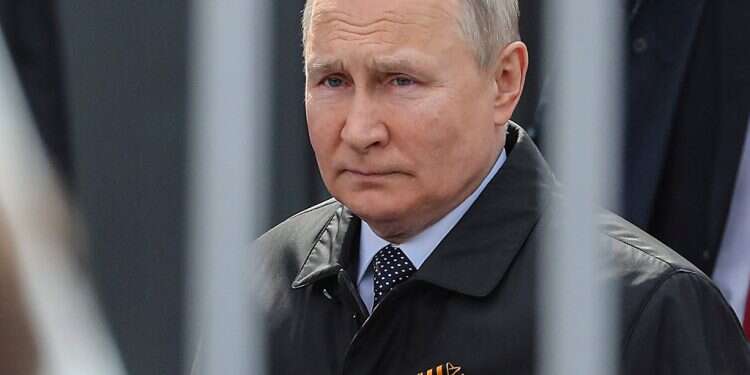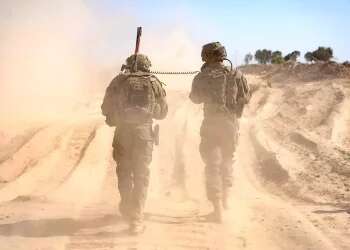At the end of last week, a dramatic development in international relations took place: The International Criminal Court in the Hague issued an arrest warrant for Russian President Vladimir Putin. The reason: The man who launched an unjust war against Ukraine just over a year ago, is responsible for the illegal deportation and transfer of Ukrainian children from the occupied territories into Russia. The court has reasonable grounds to presume that the president of Russia bears personal responsibility for this.
Follow Israel Hayom on Facebook, Twitter, and Instagram
A similar arrest warrant was issued against Maria Lvova-Belova, the Russian commissioner for children's rights, who was, and still is, one of the main forces behind the transfer of the Ukrainian children. These arrest warrants were issued after the Ukrainian state prosecutor presented to the Hague 40 (!) volumes containing evidence of the deportation of 16,221 children from the districts of Kharkiv, Luhansk, Donetsk, and Kherson to Russian territories.
While US President Joe Biden called the decision "justified" and German Chancellor Olaf Scholz added that "no one is above the law", Russia expressed disdain for this investigation. "The International Court of Justice has no significance to us, even legally," said the spokeswoman of the Russian Foreign Ministry Maria Zakharova, "Russia has not signed Rome Statute and therefore has no obligation." Zakharova may be correct from a practical point of view: It is very doubtful if the order will actually bring about Putin's arrest in the foreseeable future, also given the fact that, since the outbreak of the war, he has kept a safe distance even from his close associates, and if he has traveled to other countries, then only to those where he feels safe enough, such as Belarus, Iran or Uzbekistan.
Even if he goes to one of the 123 countries that are signed on the Rome Statute, there is no guarantee that the host country will extradite him. The former president of Sudan, who has been wanted since 2010, can testify to this, after visiting several countries that have signed this treaty.
The message: There is nothing to talk to him about
Even so, the importance of this decision should not be underestimated even for a moment. First, it conveys a clear message to the Russian elite: If an order has been issued against the president, even the officials and oligarchs are not immune. Secondly, it is a signal to wavering countries or others that are helping Russia bypass the sanctions: From now onwards, assistance to Russia is akin to assistance to a defendant. According to Steven Rapp, US Senate ambassador-at-large for war crimes, without the execution of the arrest warrant, Russia will not be able to expect the sanctions to be lifted in the future.
But above all, the order against Putin. It conveys a clear message: Vladimir Putin is becoming an outcast, a war criminal, also in regard to the international justice system. So from now on anyone asking to shake his hand will immediately cast a shadow on himself. Also, it is not clear how it is possible to consider Putin as an appropriate partner for negotiations anymore, so it seems that the West has finally made a decision: There is no point in negotiating with him any longer.
On the contrary, the warrants were issued shortly before the expected visit of Chinese President Xi Jinping to Moscow, due to commence tomorrow. If China had intentions of providing military assistance to Moscow it will now have to take into account that it will be marked as a collaborator with a war criminal.
The disintegration of the leader
By the way, the first signal to Putin being marked as an international pariah – at least for the Western democracies – came already at the beginning of February: Investigators of the July 2014 MH17 crash determined that Putin should be regarded as the one who gave the order, or permitted the transfer of the Buk air defense system to the Donbas separatists. This system was used to shoot down the Malaysian plane, en route from Amsterdam to Kuala Lumpur, killing 298 passengers and crew members in the disaster. Three of the Buk operators, two Russian citizens and one separatist from Ukraine, were convicted last November of intercepting the plane and killing its passengers.
US President Biden's speech in Warsaw three weeks ago should also be added to these two signals. On the one-year anniversary of the war, Biden emphasized the separation between the citizens of Russia and President Putin, as if reminding the former that their fate does not have to be tied to that of Putin. A possible meaning of these three steps is that the West has finally understood that it is no longer possible to communicate with Putin and is now waiting for the Ukrainian counterattack which is due to begin in late April, as well as relying on internal developments in Russia, which have been increasingly eroding on its financial reserves since the beginning of the year.
On February 26, Putin spoke for the umpteenth time about how "the West is plotting to crumble Russia," but this time added that Russia's defeat in the war could also destroy the Russian nation, which would split into Muscovites, Ural residents, and others. If we consider the fact that during his 23 years in office, Putin got used to identifying himself with the Russian nation and served as a personal embodiment, it is unavoidable that his warning against the split-up of the nation mainly conveyed a fear of his disintegration – first as a legal entity, and perhaps later on also as a physical one. The international arrest warrant does not contribute to his peace of mind.
Subscribe to Israel Hayom's daily newsletter and never miss our top stories!




